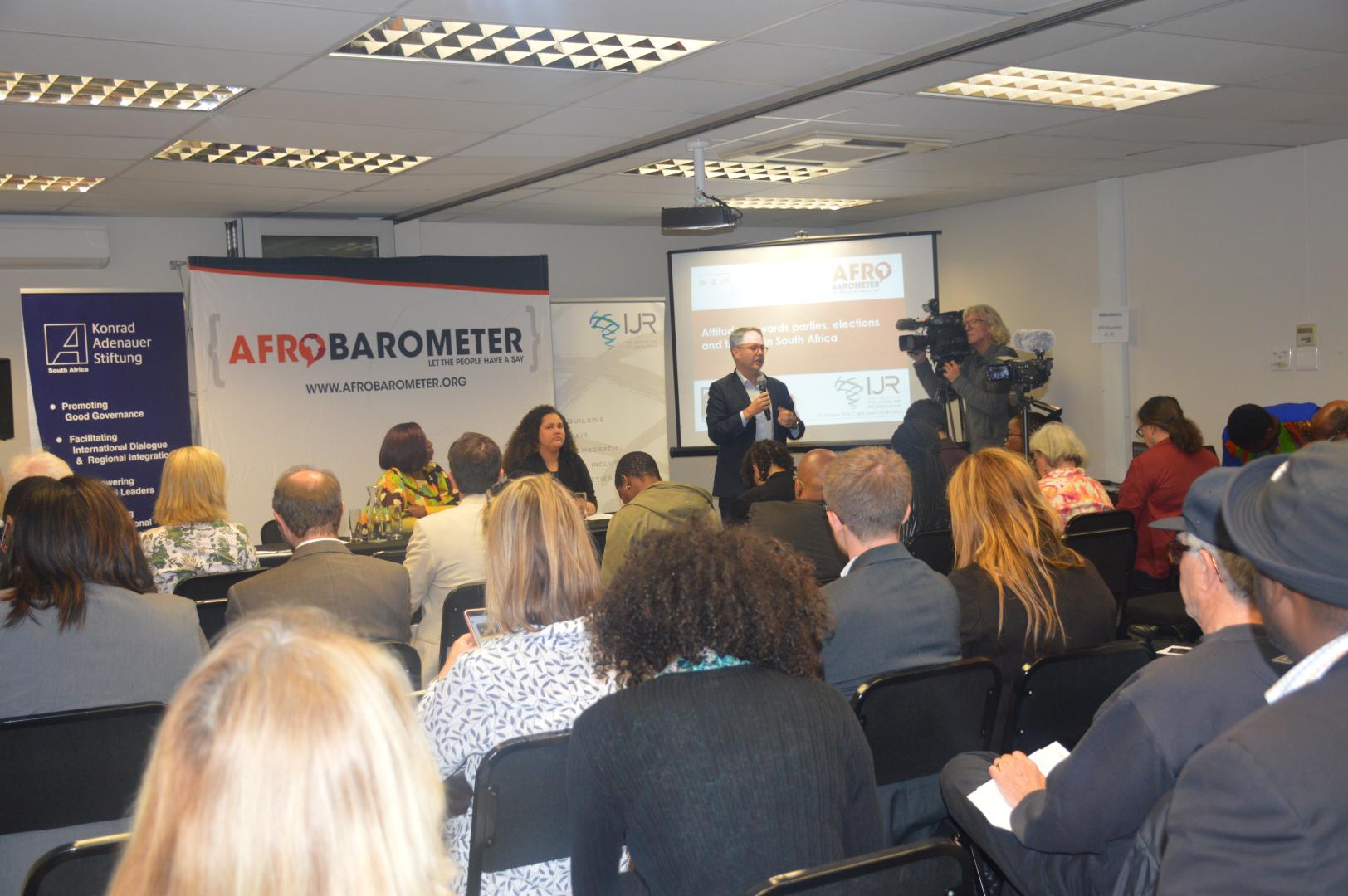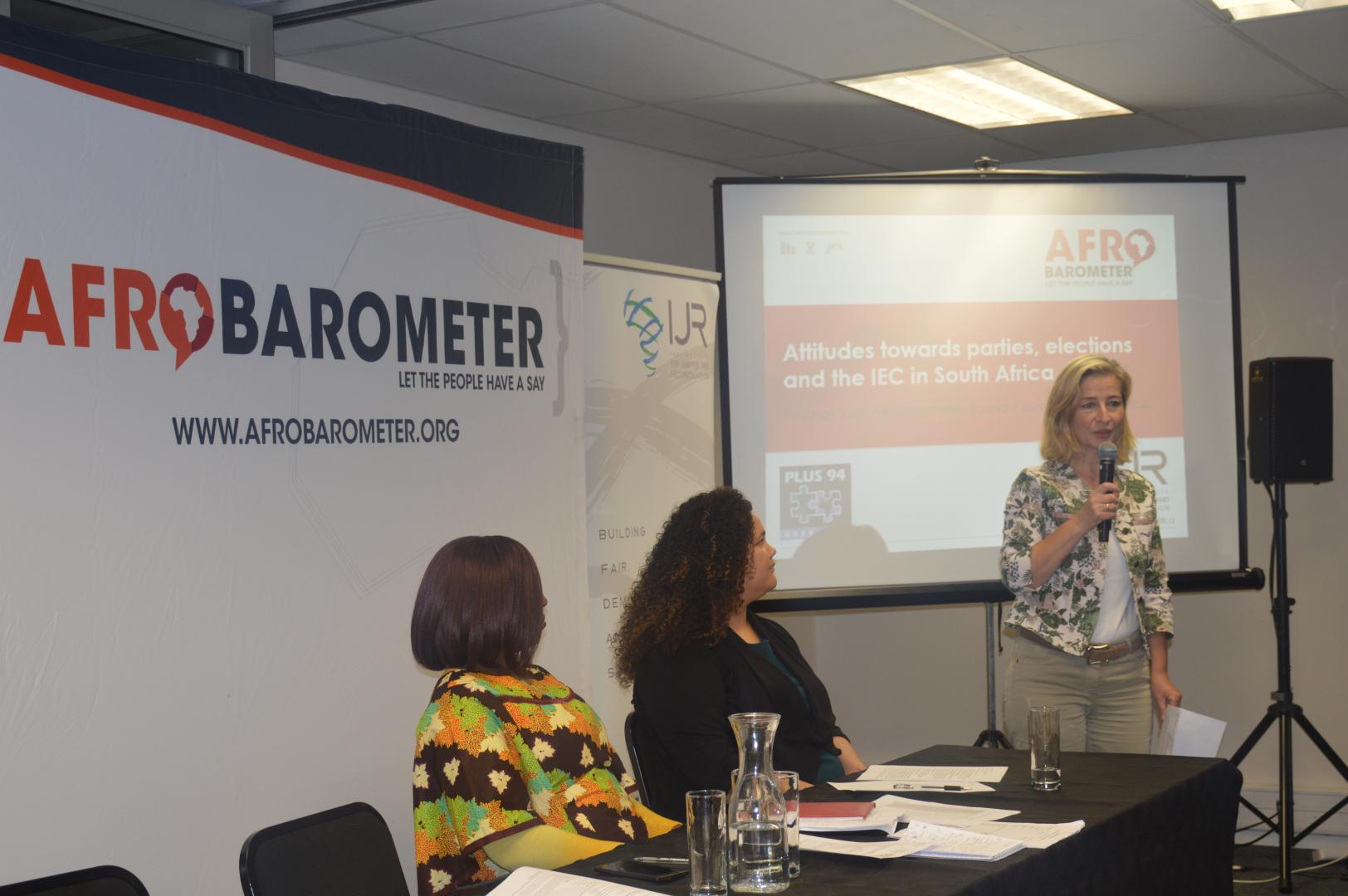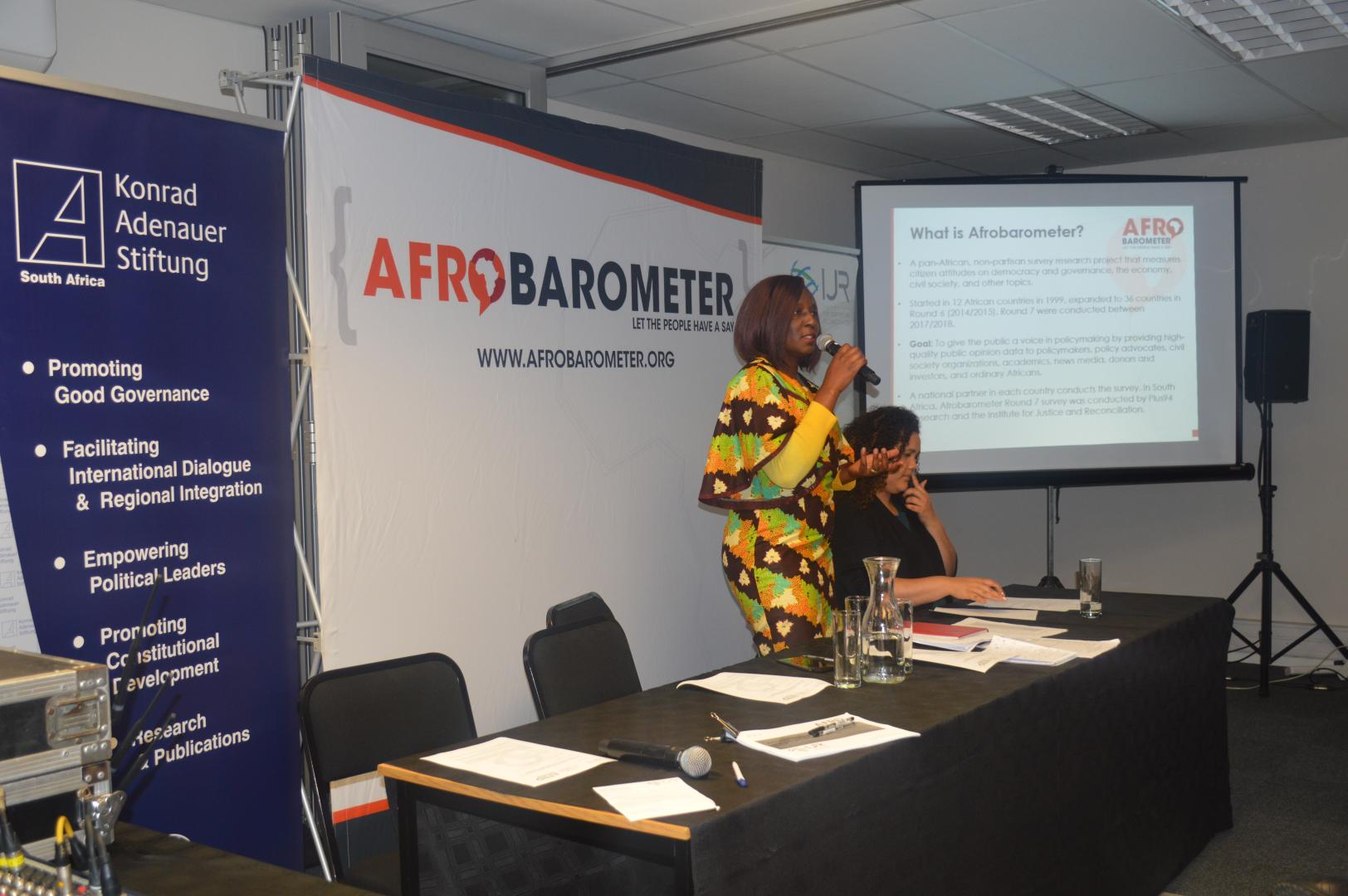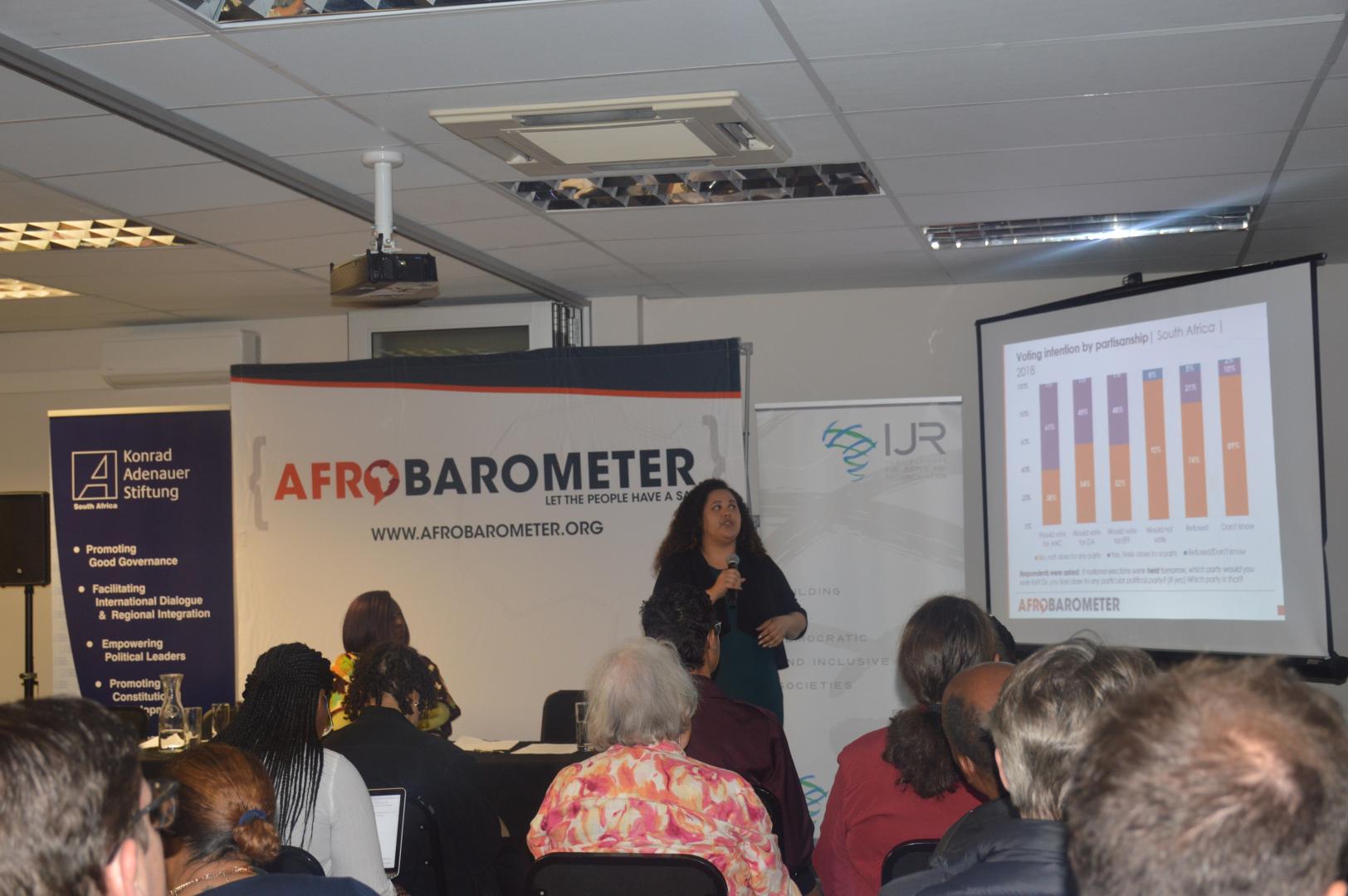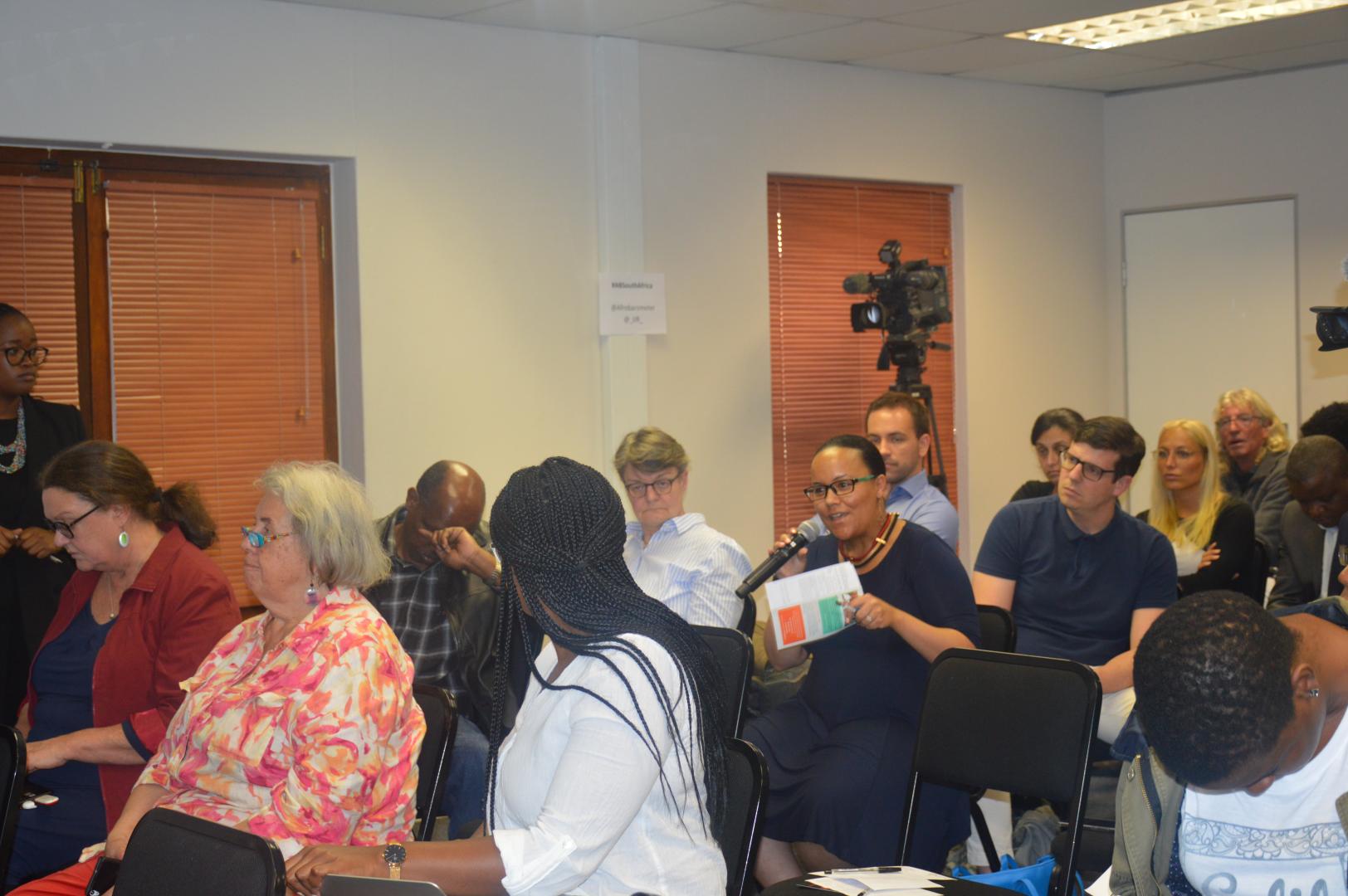The opening remarks by Jan Hofmeyr, Head of the Policy and Research Programme at IJR included a brief explanation of the IJR’s role as core partner of the Afrobarometer survey in South Africa. Christina Teichmann, KAS Project Manager, welcomed the participants on behalf of the Foundation and reminded the audience that next year’s elections will mark 25 years of democracy in South Africa. In comparison to other countries, the South African democracy is still young; however, a growing number of South Africans, in particular the youth, are already disillusioned and not eager to take part in the elections by casting their vote. According to Teichmann, these people still prefer a democracy to any other form of government but have not experienced that democracy has bettered their lives. They seem to have lost faith in the government, especially due to several corruption allegations, persistently high levels of inequality, high unemployment and a struggling economy. Taking this into consideration, public opinion surveys such as the Afrobarometer provide useful insights in terms of prevailing political attitudes on the ground.
Afrobarometer Methodology
Before the results of this year’s survey were being released, Senior Project Leader of the Afrobarometer, Anyway Chingwete introduced the Afrobarometer and its methodology to the audience. The Afrobarometer is a pan-African, non-partisan research network that conducts public attitude surveys on democracy, governance, economic conditions and related issues in Africa. Since 1999, six rounds of surveys were conducted in up to 37 Africans countries. In light of the fifth general election in South Africa, expected to be held by August 2019, the Afrobarometer team in South Africa interviewed 1,800 adult South Africans in August and September 2018 in order to find out more about party political preferences and attitudes of voters.
Key findings
The results were presented by Jamy Felton, Data Quality Officer at the Afrobarometer and focused particularly on four topics: party support in South Africa, non-partisan voters, attitudes towards elections and the willingness to give up the election right for social services. According to Felton the results have a predictive meaning for political analysis as well as for civil opinions. Key findings were the following:
Party Support
In terms of party support in South Africa the latest Afrobarometer data indicates that almost half (48%) of South Africans would vote for the African National Congress (ANC) if elections were held tomorrow. The Democratic Alliance (DA) and Economic Freedom Fighters (EFF) would tie for second place with 11% each, while more than one-fourth (27%) of citizens don’t know how they would vote, wouldn’t vote at all or refused the answer. The data also revealed that the ANC is considerably stronger in rural areas (59%) than cities (43%), while the DA more than triples its rural share (4%) in urban areas (14%) and the EFF features a urban-rural balance (11% each). Furthermore, men and women expressed similar voting preferences except for an EFF weak-ness among women (8%). Divided by age group, the ANC appears to have the weakest support among younger citizens (43% of 18-to 25-year-olds). In contrast, the EFF is stronger among younger respondents (17% of 18-to 25-year-olds) than the elderly.
Non-Partisanship
Strikingly, according to the latest Afroba-rometer data, the proportion of non-partisan voters has increased enormously. Thus, more than half (53%) of South Africans said that they do not feel close to any political party, which is the largest proportion of “non-partisans” since the year 2000. Taking demographic aspects of these non-partisans into account it becomes evident that the majority lives in urban areas, is under the age of 35 and has a secondary or even post-secondary education. According to Felton, the significant proportion of people who don’t feel close to any party leads to the assumption that political parties might be able to influence these potential voters through party campaigns and/or policy.
Attitudes towards Election
A closer look at the attitudes towards elections in SA showed that more than two-thirds (69%) of citizens say that elections are free and fair, however, yet only about half as many (38%) say they trust the IEC, which displays the lowest score of positive responses since 2000. As a result, the popular trust in the Commission has dropped dramatically (31 percentage-points decline since 2011). However, the researcher noted that the publics’ trust in other institutions has also declined due to state capture and other corruption scandals under the Zuma administration.
In general, six out of ten people deem regular, open, and honest elections as the best way to choose leaders, support multiparty competition and reject one-party rule and one-man-rule.
One of the most striking findings was that even though South Africans expressed a general preference for elections the willingness to give up the election right in exchange for social services is high. Six out of ten South Africans (62%) expressed their willingness to forgo elections if a non-elected government could provide law and order, jobs and housing. This may arise from the fact that only one-fifth (22%) of South Africans are satisfied with the performance of the government at providing jobs, and fewer than one-third (30%) with its efforts to improve living standards of the poor.
At the end of the presentation, the audience had the possibility to ask questions. A detailed report on the Afrobarometer survey findings can be found on the Afrobarometer website: http://www.afrobarometer.org/.



